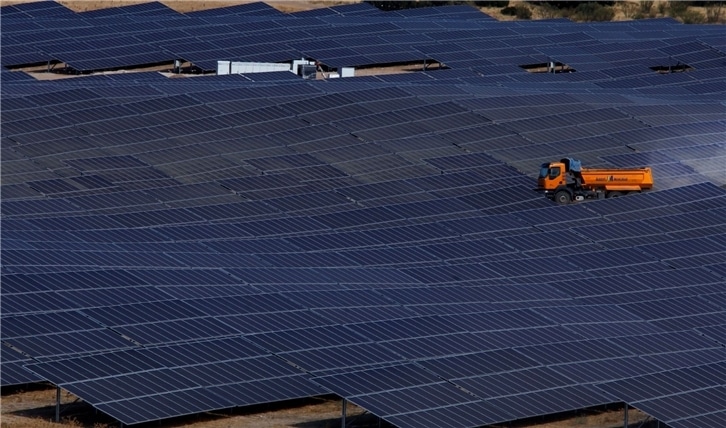With official results of Spain’s auction now published, it is time to take stock. For the first in time in the history of Spain’s auction program, photovoltaics does not cover all of the offered capacity. Just 5.75 MW of a 300 MW reserve set aside for small projects was awarded, and another 600 MW reserve for facilities already at an advanced stage of development saw just 21.9 MW awarded to distributed generation projects.
Several of the biggest players active in Spain’s project market – including Iberdrola and Enel (via subsidiary Endesa) – chose not to participate in this auction, and look to be exploring investment in other countries. Ignacio Galán, president of Iberdrola, shared billion-investment plans for the UK market, accompanied by photos with the Queen and Prime Minister Boris Johnson. Three days ago, it emerged that the company had fired its communications director.
Reports from Spanish newspaper El Confidencial, citing sources familiar with the company’s plans, say that Enel has “decided to limit its investment ambition in its Spanish subsidiary, and redirect a part of the investment planned for Spain to the United States.
Spanish PV industry association UNEF has so far not spoken publicly about the auction, other players involved in the sector, however, shared their assessments.
APPA: “reserve price is the key”
José M.ª González Moya, general director of the Association of Renewable Energy Companies (APPA), affirms that “in general terms, our assessment is positive because almost all of the offered capacity has been covered at prices which are more than competitive,” he told pv magazine. “But the quota was not covered entirely, even though there seemed to be reasonable competitive pressure. We do not know the reasons for this.”
The association expressed surprise at the “the high level of wind power awarded, and the relatively small capacity won by photovoltaics.” Since not all data on the auction is made public, the association says it does not know why wind took such a large share of the capacity on offer, or if it was due to a lack of mature projects. “It is probably due to the fact that photovoltaics has more uncertainty in the longer term, due to the rising price of raw materials,” said Moya.
He goes on to add that “two companies have taken a very high volume of this auction, and in other cases there is much more dispersion in the number of successful bid. This should give us pause for thought.” Moya agrees with others involved in the auction that the “almost deserted” quota for projects with accelerated availability should be redesigned, and that the other segment reserved for distributed generation projects was “an even greater failure”. The reasons for this are not clear, he continues, “perhaps the requirements to bid were not adequate, or there was not enough time to prepare.”
Moya further notes the absence of the large players, “some will have resigned due to problems with uncertainty, we do not know if they had been preparing projects to participate.”
“We will know the success of this auction once these projects are working, not today,” he summarizes. “We can say that everything is fine, the auction resulted in very competitive prices. But now we have to put all of that into operation.”
Regarding the prices, he says that “they are surprisingly low, as happened in January. In renewables, and in solar in particular, economies of scale matter, project sizes matter. We do not know if the social or distributed quota was not covered because not enough bids were made, or they were left out due to price. The reserve price is not public, it could be that projects were left out because they could not reach this price. This is the key.”
Fundación Renovables: “Projects are bid to gain market position”
For Fundación Renovables, the results are “generally quite in tune with our expectations. It is true that it is surprising that the maximum bid volume of 3498 MW was not covered,” explained the Fundacion’s communications director Ismael Morales.
The key takeaway, in Morales’ opinion, is “low participation of PV generation, in addition to the fact that prices have been low for electricity companies that have participated, and that the majority was awarded to two developers.”
Popular content
He adds that, “the accelerated quota is a reflection of the fact that real projects are not presented here with the maturity to meet installation deadlines, but are presented rather to gain market position. This issue should be analyzed because it can make the difference between reality and wishes.”
Regarding the non-participation of large companies, he states “the auctions are not designed for integrated electricity companies, it will always be more interesting for them to get a transfer price with clients than a competitive auction. To see this as a protest or boycott, however, is not really accurate.”
A final point, he notes that “it is curious that the proposals of less than 5 MW have prices offered in the same range as much larger projects. This could mean that the larger plants could have bid even lower.”
Anpier: “In Europe, we are not at the center and don’t expect to be”
National Association of Photovoltaic Energy Produceres (Anpier) director Rafael Barrera focused more on the consolidation among winners. “for Anpier, the result has been bittersweet, the reserves for rapid installation and distributed generation did not function well. We understand the gesture in trying to make the auction more accessible to small producers, but we warned from the start that there would still be barriers. We hope to see a new auction proposed, with a new, higher quota that’s more adjusted to realities of smaller players.”
He cites economies of scale, access to grid connections, and the short time between the call for bids and the auction deadline, as issues with the capacity reserved for distributed generation projects.
“When calculations are made, the cutoff price is very low. It is very difficult to reach prices below €42/MWh with price increases in steel and modules.” Barrera concludes by stating that “Europe says it wants to put citizens at the center, but we are not here and don’t expect to be.”
The proud winners
Capital Energy, which walked away with the largest share of capacity on offer, told Spanish newspaper El Mundo that “investor appetite in Spain is very high. The fundamentals of the renewables sector remain solid.”
Forestalia and Enerland Group both shared assessments “Forestalia will comply with the obligations derived from this award as it has been doing up to now, with the same rigor and compliance with deadlines as in previous auctions,” says the company, which has been awarded 777.90 MW in the auction (562, 40 MW wind and 215.50 MW photovoltaic).
Enerland Group, which was awarded three projects within the group of local photovoltaic installations, where it has been, together with Blacksalt, one of the only two awardees. “We are proud to have been awarded the projects in a category in which there are only two companies. We work both large and local projects because we like to bet on our territory and give value to it by promoting the development of renewable energy ”, says the company from Zaragoza.
The third vice president and minister for the Ecological Transition and the Demographic Challenge, Teresa Ribera, highlighted that the auction, raised at a particularly delicate moment in the European energy panorama, “represents the consolidation of new actors” and “the interest and confidence of investors ”. Time will tell.
This content is protected by copyright and may not be reused. If you want to cooperate with us and would like to reuse some of our content, please contact: editors@pv-magazine.com.



By submitting this form you agree to pv magazine using your data for the purposes of publishing your comment.
Your personal data will only be disclosed or otherwise transmitted to third parties for the purposes of spam filtering or if this is necessary for technical maintenance of the website. Any other transfer to third parties will not take place unless this is justified on the basis of applicable data protection regulations or if pv magazine is legally obliged to do so.
You may revoke this consent at any time with effect for the future, in which case your personal data will be deleted immediately. Otherwise, your data will be deleted if pv magazine has processed your request or the purpose of data storage is fulfilled.
Further information on data privacy can be found in our Data Protection Policy.